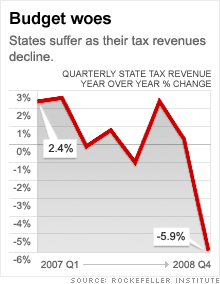A few choice excerpts from this article, hat-tip to Ash:
http://money.cnn.com/2009/05/07/news...ion=2009050713

The latest blow came from the April 15 income tax returns, which states are tallying now. The weak stock market has decimated capital gains tax revenue, upon which many states depend, experts said.
Already, several states have found revenues coming in well below estimates, prompting officials to scramble to close gaps. Massachusetts and Ohio, for instance, are facing new gaps that could exceed $900 million each. New Jersey is looking at a $500 million shortfall after a government report predicted revenues will come in $1.2 billion below projections, in large part because of sagging income tax revenue.
[..]
In Massachusetts, April tax revenue came in $953 million, or 35%, less than a year ago. Officials had anticipated that revenue would fall, but it came in $456 million below their most recent estimate, made on April 15. The bulk of the shortfall came from a $905 million drop in income taxes.
The state, which has already dealt with a $3 billion budget gap since the start of the fiscal year, now has to come up with nearly $1 billion before June 30. It will likely have to turn to its $1.3 billion rainy day fund and draw from its nearly $1 billion federal stimulus allotment designed to maintain state support of education and public services.
[..]
Ohio, meanwhile, saw income tax revenue come in 22% below projections. Through April, income tax receipts are $397 million below the current estimate for fiscal 2009. It's the worst drop in the state's history.
This means the state is facing a budget shortfall that could exceed $900 million, according to Gov. Ted Strickland's office. He's already cut nearly $2 billion from the state's biennial budget, which runs from July 1, 2007 through June 30, 2009. And last month, he ordered additional restrictions, limiting spending on contracting, supplies and services to critical needs only.
[..]
Unlike its 46 peers whose fiscal years end on June 30, Michigan has until the end of September to balance its budget. But the tax shortfalls have been no kinder to the Wolverine State.
The state revised its revenue estimates downward in January, but the numbers are coming in "way below" those figures, said Liz Boyd, spokeswoman for Gov. Jennifer Granholm. State general fund revenues are projected to decline 21% from fiscal 2008, by far the largest one-year decline in at least 50 years. New estimates will be released mid-month.
This forced the governor to announce Tuesday a $350 million spending cut, including a 4% across-the-board reduction.
http://money.cnn.com/2009/05/07/news...ion=2009050713

The latest blow came from the April 15 income tax returns, which states are tallying now. The weak stock market has decimated capital gains tax revenue, upon which many states depend, experts said.
Already, several states have found revenues coming in well below estimates, prompting officials to scramble to close gaps. Massachusetts and Ohio, for instance, are facing new gaps that could exceed $900 million each. New Jersey is looking at a $500 million shortfall after a government report predicted revenues will come in $1.2 billion below projections, in large part because of sagging income tax revenue.
[..]
In Massachusetts, April tax revenue came in $953 million, or 35%, less than a year ago. Officials had anticipated that revenue would fall, but it came in $456 million below their most recent estimate, made on April 15. The bulk of the shortfall came from a $905 million drop in income taxes.
The state, which has already dealt with a $3 billion budget gap since the start of the fiscal year, now has to come up with nearly $1 billion before June 30. It will likely have to turn to its $1.3 billion rainy day fund and draw from its nearly $1 billion federal stimulus allotment designed to maintain state support of education and public services.
[..]
Ohio, meanwhile, saw income tax revenue come in 22% below projections. Through April, income tax receipts are $397 million below the current estimate for fiscal 2009. It's the worst drop in the state's history.
This means the state is facing a budget shortfall that could exceed $900 million, according to Gov. Ted Strickland's office. He's already cut nearly $2 billion from the state's biennial budget, which runs from July 1, 2007 through June 30, 2009. And last month, he ordered additional restrictions, limiting spending on contracting, supplies and services to critical needs only.
[..]
Unlike its 46 peers whose fiscal years end on June 30, Michigan has until the end of September to balance its budget. But the tax shortfalls have been no kinder to the Wolverine State.
The state revised its revenue estimates downward in January, but the numbers are coming in "way below" those figures, said Liz Boyd, spokeswoman for Gov. Jennifer Granholm. State general fund revenues are projected to decline 21% from fiscal 2008, by far the largest one-year decline in at least 50 years. New estimates will be released mid-month.
This forced the governor to announce Tuesday a $350 million spending cut, including a 4% across-the-board reduction.
Comment